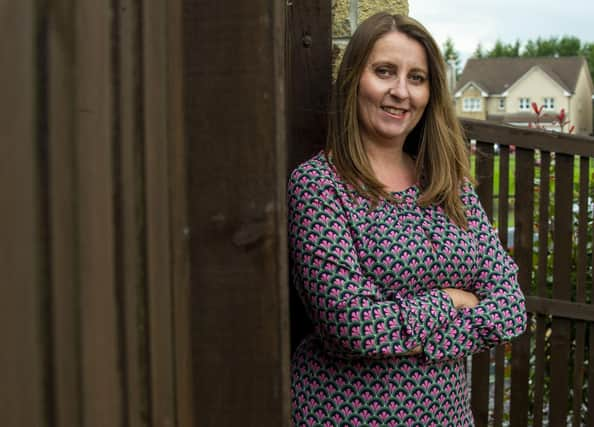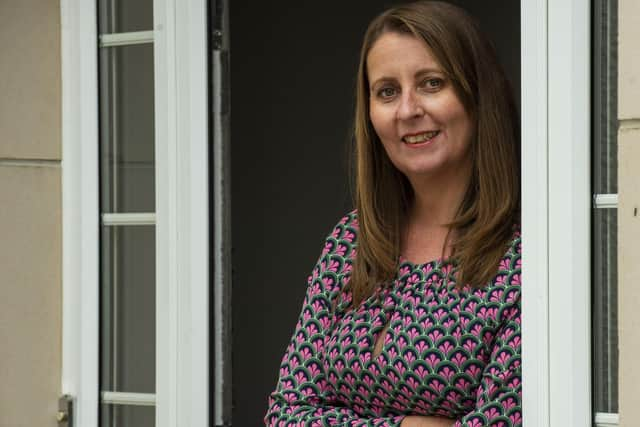The Big Interview: Jackie Leiper, Scottish Widows' pension distribution director


Jackie Leiper is managing director, workplace savings and distribution, at Scottish Widows. The financial services firm – which is part of Lloyds Banking Group – was set up in 1815 to take care of women and children who lost men in their family in the Napoleonic Wars, and it now looks after almost six million customers across the UK.
What does your role involve?
I lead our workplace savings business where we support more than 20,000 employers with their workplace pensions. This equates to more than three million people saving. We help individual companies look after their employees’ retirement saving and financial planning including education and employee communications.
Advertisement
Hide AdAdvertisement
Hide Ad

The UK government has made a number of changes in recent years mandating the need for employers to provide workplace savings under auto-enrolment – an area that’s heavily regulated – so my role also includes the formal responsibilities around that.
I also manage the relationships with our distribution partners, where we combine our areas of expertise to ensure people have access to the information needed to make the most of their long-term savings.
How did your career progress before this?
I started my career with Scottish Amicable (which was acquired by Prudential) and so my working life has all been financial services – with pensions right at the heart. I’ve been lucky to have had experience in different areas of the business. There are very few women in this industry in my area of expertise and there have been times – especially when I was younger – when I felt like I had a material disadvantage.
Times have changed and there is a lot of progress, but this has fuelled a real personal desire for supporting women in financial careers, and more broadly to help empower more women in general to take greater responsibility for their financial future.
Lockdown has had a polarising effect on people’s finances, and there has already been a spike in zero-hours contracts, for example – what changes have you seen in pension saving?
The pandemic has revealed a painful lack of financial resilience in the UK, leaving millions of people exposed with little or no safety net. Our latest Scottish Widows Retirement Report found that one in ten people reduced or stopped saving into a pension because of coronavirus and that those who already struggle to put away for retirement are most financially affected by Covid-19, including the self-employed, part-time and younger workers.
Nearly half of self-employed workers have seen a drop in their income, and just under a third are not saving anything at all for retirement now.There are a number of sectors having to make changes to adapt and survive. For people affected, this will mean contributions stop until they can find new employment, but it’s still too early to get a clear idea of the real picture.
Fortunately, we haven’t yet seen any dramatic increase in individuals trying to access their pension because of Covid-related financial difficulties, but this could still happen, and we have seen fraudsters try to take advantage of the pandemic by coming up with new pensions scams to trick people into handing over their life savings.
Advertisement
Hide AdAdvertisement
Hide AdWhat actions is Scottish Widows taking to help foster women in preparing for retirement and reducing the gender pension gap?
The proportion of women saving adequately has risen steadily over the past few years, with the retirement savings gender gap starting to narrow. But despite this progress, it’s still a slow burner. It’s also worrying that women form a significant part of many of the industries that have been hit hard by the pandemic.
We have been researching and reporting on the gender pensions gap for more than 15 years, and we have called for a single lifetime savings pot to be introduced, funded through an extension of automatic enrolment, that could be accessed a fixed number of times for emergency access to cash.We believe that everyone should have penalty-free access to some of their pension savings.
At every age, men’s savings outpace women’s and this could be for a number of reasons, including the gender pay gap, women taking maternity leave, or choosing to work part-time to support caring responsibilities.
On a day-to-day basis, we have also been developing more targeted communication materials and support services for women to inform those key life decisions where pension saving can be significantly affected. For example, when relationships break down and assets are divided on divorce.
It was announced earlier this year that you would be chairing the Money and Pensions Services’ Financial Wellbeing Challenge Group: Gender and Financial Wellbeing. What do you aim to achieve with the role?
The big goal for me is to help ensure that the services provided are accessible and relevant to those who need them most. It’s the key decisions at certain stages of life that can make or break people’s financial future.
I’m passionate about doing all we can to address existing inequalities so that everyone has the best chance to improve their financial resilience and that money and finances are discussed more openly in families and relationships.
Advertisement
Hide AdAdvertisement
Hide AdIn particular, creating a savings habit in younger generations and being less reliant on credit for everyday living is a top priority to achieve financial wellbeing.
I was involved with the first Insuring Women’s Futures programme, and I plan to take inspiration from the work I’m involved with there to the Money and Pensions Services’ group, including creating more inclusive and flexible workplaces where women can thrive, as well as better products and services.
We need to build these things on the basis that women’s financial lives differ and that their working lives don’t always follow a linear pattern. The disruption to paid work is so intrinsically linked with the gender pension gap. There’s also a gap that we need to bridge in terms of awareness among women when it comes to financial aspects of divorce.
The link between money and mental health is also increasingly coming to the foreground – what more should be done to tackle the issue?
Our most recent research found that 68 per cent of those with financial worries say it has harmed their mental wellbeing. So one area that I am really keen to see more is better education for young adults on the basics of managing finances.
Helping people to be more in touch with their future selves and their pension on a regular basis will help them to take the right steps and keep retirement saving as a part of managing everyday finances.
Millions of our Scottish Widows workplace pension customers with a Lloyds Banking Group (Bank of Scotland, Lloyds Bank or Halifax) account can already see their pension alongside their banking. People log in to online banking around 26 times per month and if you contrast that with an annual pension statement then you can get an idea of the difference.
Scottish Widows recently became the first investor in the Blackrock climate fund – can you explain more about the rationale behind this?
Advertisement
Hide AdAdvertisement
Hide AdAs the industry focus on responsible investment grows, so does our customers’ interest in investing more sustainably. We are initially allocating £2 billion of our pension portfolios into this fund – which we also helped to design.
This is part of our wider commitment to offering customers more sustainable investment choices and challenging companies in which we invest to behave more sustainably and responsibly. We also recently launched a new responsible investment and stewardship framework.
Our commitment to responsible investment is also fully supported by Lloyds Banking Group, which recently unveiled its ambition to help reduce the carbon emissions it finances by more than 50 per cent by 2030.
Who do you admire in business?
I particularly admire the women breaking through the glass ceiling into the top jobs in my sector, such as Alison Rose at NatWest and Amanda Blanc at Aviva. They have worked incredibly hard to trailblaze as well as supporting and sponsoring other women.
I’m also full of admiration for some of the role models we have created within my own team in Scottish Widows, including some who jobshare at a senior level, demonstrating that it is possible to juggle home and work life.
We have put a lot of energy into creating more flexible working patterns to help demonstrate to others that it is possible and to nurture and motivate the talent we have in the organisation – regardless of gender.
A message from the Editor:
Thank you for reading this story on our website. While I have your attention, I also have an important request to make of you.
The dramatic events of 2020 are having a major impact on many of our advertisers - and consequently the revenue we receive. We are now more reliant than ever on you taking out a digital subscription to support our journalism.
Advertisement
Hide AdAdvertisement
Hide AdSubscribe to scotsman.com and enjoy unlimited access to Scottish news and information online and on our app. Visit https://www.scotsman.com/subscriptions now to sign up. By supporting us, we are able to support you in providing trusted, fact-checked content for this website.
Joy Yates
Editorial Director
Comments
Want to join the conversation? Please or to comment on this article.